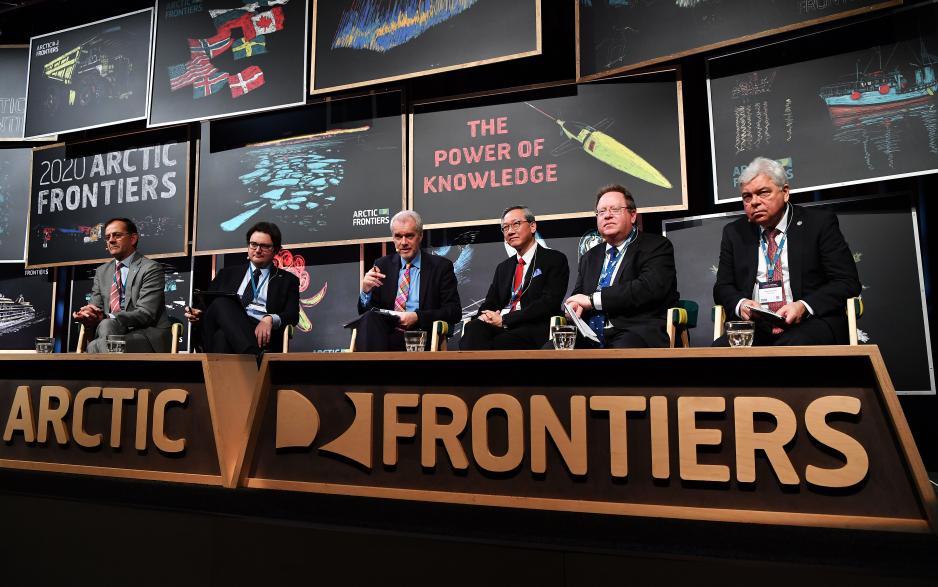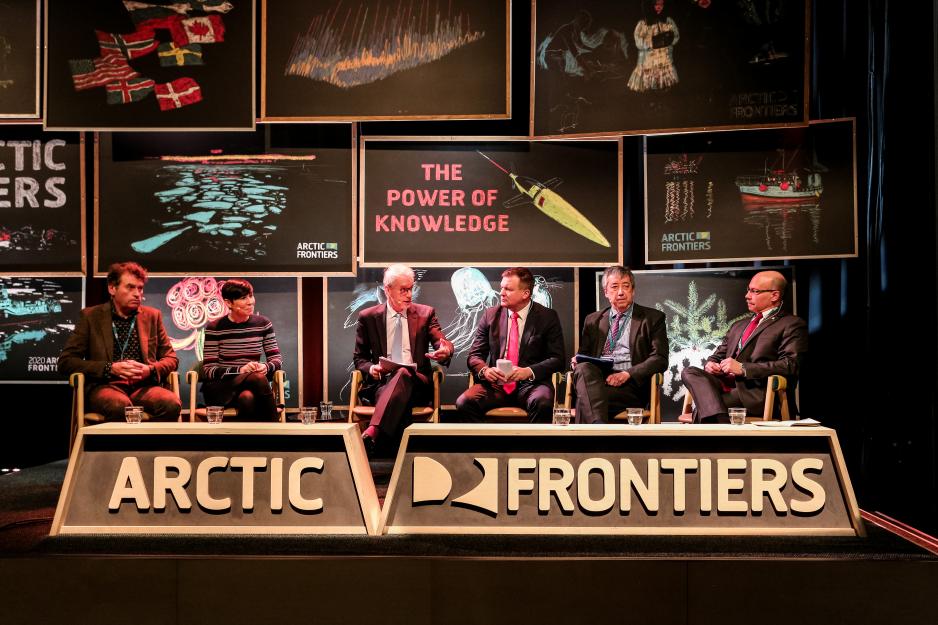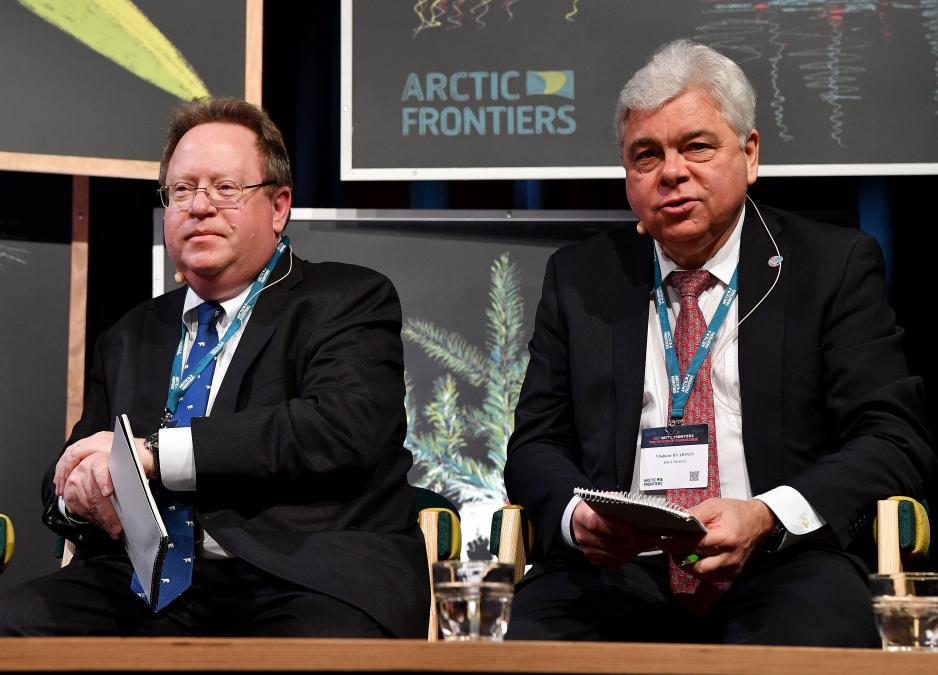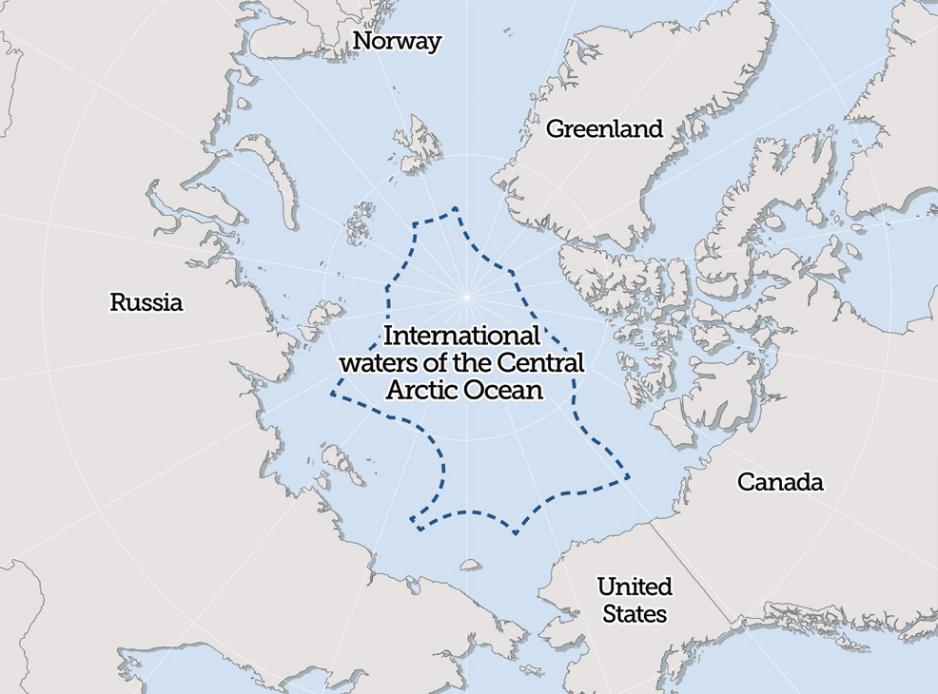We Are Not Looking to Bring Security Policy Issues Into the Arctic Council, Says US Official

Arctic Frontiers 2020, Plenary Session 4-Sustainable Arctic Ocean. From left: Manuel Barange, Jens Frølich Holte, Stephen Sackur, Sam Tan, Evan T Bloom and Vladimir Ryabinin. Photo: Terje Mortensen/Arctic Frontiers 2020
While the Arctic has been seen as a desired area for further hydrocarbon activities by the Trump Administration, the US is also a major contributor to climate and scientific research in the region. – It’s vital to move in tandem with science, says Evan T. Bloom, who has worked with ocean and polar affairs in the State Department for more than two decades.
TROMSØ: Evan T. Bloom, Acting Deputy Assistant Secretary of State for Oceans and Fisheries at the U.S. Department of State, participated in a panel debate at the Arctic Frontiers conference in Tromsø last week.
"It’s vital that everything in terms of ocean policy be handled sustainably, to take a precautionary approach and to move in tandem with science," Mr. Bloom said in the panel debate on “Sustainable Arctic Ocean”.
High North News has interviewed Mr. Bloom, who works with polar affairs at the State Department level and is responsible for foreign policy related to the Arctic, fisheries, oceans and maritime affairs. Mr. Bloom has also worked on legal issues related to climate change, space and polar affairs in the State Department. He was a U.S. negotiator for the Kyoto Protocol on Climate Change.
The US and the Arctic Council
Mr. Bloom has for the past twenty years, during various administrations, worked with Arctic Council issues since the intergovernmental forum was established in 1996. He helped establish the Council when the Canadians approached the US to start working on it. Since 2006 he has been the supervisor of the U.S. Senior Arctic Official, who oversees the work of the Arctic Council on a daily basis.
Last year, the Arctic Council Ministerial Meeting took place in Rovaniemi in Finland. At the meeting, US Secretary of State, Mike Pompeo gave a speech in which he launched a verbal attack on both China and Russia.
To High North News, Mr. Bloom says that Mike Pompeo did raise security issues at the meeting, but also notes that this should not be seen as an attempt to bring security policy issues into the Arctic Council.
"There has been some confusion because he gave a big speech that focused on China for example. It was the day before the Council meeting. However, that speech was not an Arctic Council speech, it was an Arctic policy speech."
The Council focuses primarily on sustainable development and environmental protection and that continues to be the case.
There has been a debate for some time regarding whether the Arctic Council should address security policy matters. At the Ministerial Meeting in Rovaniemi, both Finland and Iceland’s Prime Ministers raised the issue and agreed that there is a need for a discussion whether the Arctic Council should address security policy issues.
Also read

Arctic Frontiers 2020. Plenary session 1 - The State of the Arctic. From left to right: Mat Collins, Joint Met Office Chair in Climate Change, College of Engineering, Mathematics and Physical Sciences, University of Exeter / Ine Eriksen Søreide Minister of Foreign Affairs, Norway / Stephen Sackur, Moderator / Ville Skinnari, Minister for Development Cooperation and Foreign Trade, Finland / Bobo Lo, International relations analyst / Mike Sfraga, Director, Wilson Center’s Global Risk and Resilience Program and Polar Institute. Photo: Alberto Grohovaz/Arctic Frontiers 2020.
At Arctic Frontiers last week, Bobo Lo, an Australian independent international relations analyst, took part in a panel on the State of the Arctic. He talked about the need for new frameworks in the region, more specifically a new Arctic treaty, that can address modern challenges in the region, such as climate change and its implications for the Arctic, as well as security issues. Ine Eriksen Søreide, the Norwegian Minister of Foreign Affairs, who participated in the same panel, questioned the idea that a new treaty would be better than the existing framework.
"The Council focuses primarily on sustainable development and environmental protection and that continues to be the case, so we are not looking to bring security type issues into the Council," Mr. Bloom said to High North News.
Also read
Energy security - and sustainability?
At the panel debate, Mr. Bloom received questions regarding oil explorations in the Arctic. As with Norway, the US has looked to Arctic maritime areas with regards to oil exploration and extraction, while at the same time talking about the need for sustainable ocean management.

Arctic Frontiers 2020, Plenary Session 4- Sustainable Arctic Ocean. From left: Evan T Bloom and Vladimir Ryabinin. Photo: Terje Mortensen/Arctic Frontiers 2020
While making it clear that sustainability and a precautionary approach is vital to what the U.S. does in the Arctic, he also asserts that deep-sea activities that promote energy security cannot be excluded:
“At least for our government it is important to have a mix of fuel options going forward into the future. I don’t see a lot of countries closing their EEZ [exclusive economic zone] to these sorts of developments,” he added during the panel.
At the same time as the Trump Administration has proposed to roll back regulations put in place under the Obama Administration to prevent oil and gas development in Arctic offshore areas, the US is at the same time a major contributor to scientific research on climate change, particularly with regards to the Arctic region, and within the Arctic Council. Mr. Bloom previously co-chaired, together with a Russian counterpart, the Arctic Council’s Task Force for Enhancing Scientific Cooperation in the Arctic (SCTF).
The Arctic Council Ministerial Meeting in Finland was the first time a Ministerial Meeting ended without a joint declaration, partly due to disagreements about climate change issues. What are your thoughts on that?
"I think the important thing to take from the meeting in Rovaniemi is the actual continuity that occurred for the Arctic States. The Secretary was very clear about his and the US’ support for the Arctic Council. The other thing is that the Senior Arctic Officials’ Reports to Ministers was endorsed, and that meant that the future work with the council, and the mandate for that work, was secured and agreed by the ministers. So operationally, that is the most important thing."
Also read
"For those who think: where is the U.S. on climate change? In terms of the Arctic, that [the NOAA, annual Arctic report card] is a very good document to take a look at, it is available online and has good background about the profound changes."
The National Oceanic and Atmospheric Administration (NOAA) is a scientific agency under the Department of Commerce, which does an annual Arctic report card. It was last issued at the end of 2019.
"It has very strong scientific information about the effects of global warming on sea ice retreat, on Arctic communities and ecosystems, and that is a very strong U.S. government contribution to the questions related to climate change," Mr. Bloom says.
The Central Arctic Ocean Agreement
The NOAA Arctic Report Card 2019 points out that “Bering and Barents Seas fisheries have experienced a northerly shift in the distribution of subarctic and Arctic fish species, linked to the loss of sea ice and changes in bottom water temperature.”
While there are currently no commercial fisheries in Arctic high seas, measures are already being put in place by central actors as fish stocks are believed to move northwards as the water gets warmer, making the area more attractive to commercial fishing.
In 2018, the US ratified the Agreement to Prevent Unregulated High Seas Fisheries in the Central Arctic Ocean. In addition to the U.S. there are nine other participants in the agreement: Canada, China, Denmark, Iceland, Japan, Norway, Russia, South Korea, and the EU have signed the Agreement.
In the panel debate, Mr. Bloom brought up the example of the Central Arctic Ocean Fisheries Agreement:
“(The agreement) is an excellent example of international cooperation in the Arctic that focuses on the need to develop science and to act in a precautionary manner as we go forward.”
To High North News, Mr. Bloom adds:
"We are looking forward to implementing the Central Arctic Fisheries Agreement which will enter into force after four more of the ten parties ratify it. We are very supportive of that, but I think commercial fisheries in the Central Arctic Ocean is probably many years away."
The Central Arctic Ocean Agreement is a multilateral agreement between ten actors with interests in Arctic maritime areas. Five of them are Arctic coastal states.
The U.S. is however not a party to the United Nations Convention of the Law of the Sea (UNCLOS), which, in addition to the Arctic Council, is one of the other key structures in the Arctic region, providing an international legal framework for governance in Arctic waters.
For the treaty to be ratified, it requires bipartisan consent of the U.S. Senate, and while there have been attempts, the treaty has not yet been ratified by the U.S.
"This administration has not focused in particular on convention ratification, but it has not excluded the idea either," Mr. Bloom points out.
I don’t know what will happen in terms of ratification, but we do support the Law of the Sea.
"We follow the Law of the Sea Convention and its rules when it comes to the traditional uses of the ocean. That’s everything related to freedom of navigation, and that is part of why we continue to support the Ilulissat Declaration, which talks about the importance of the Law of the Sea for the Arctic region."
Russia to take over Chairmanship next year
In 2021 Russia will be taking over the Chairmanship in the Arctic Council. Mr. Bloom tells High North News that he looks forward to working with them on Arctic Council issues.
"The Arctic is an area where by and large we have been able to do some cooperation with the Russian government. That is in some way an exception to some other aspects of our bilateral policies, but we look forward to cooperating with them. We hope to learn more about their priorities for their Chairmanship. The normal course after Iceland is Russia, so we will work with them."






